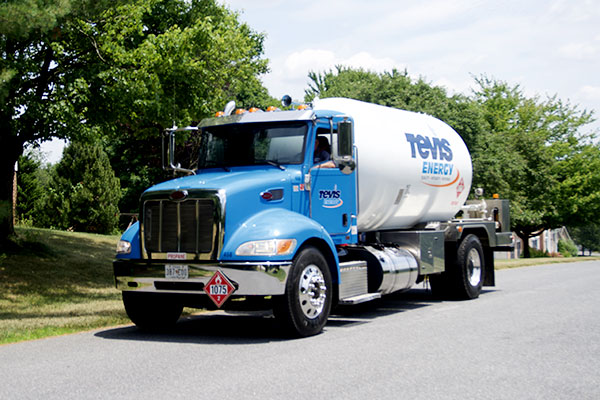Are you aware that a properly functioning propane tank regulator is your first defense against fuel inefficiency and safety hazards? At Tevis Energy, renowned for our reliable propane delivery and expert home propane tank installations, we emphasize the importance of optimal system performance.
In this article, we’ll delve into the essential roles of propane tank regulators, explore the different types available, and underscore the significance of regular inspections and diligent care to maintain safety and efficiency in your propane system.
Propane Tank Regulators: What They Are & Why They Matter

Propane tank regulators are essential devices that control the pressure of propane from the tank to ensure it is safe and effective for appliance use. Understanding these components is vital for maintaining the optimal performance and safety of your propane setup.
Reliable Propane Services with Tevis Energy! From tank installations to fuel delivery, we’re here to meet your needs. Call us today!
What is a Propane Tank Regulator?

A propane tank regulator is a vital safety component attached to your propane tank that controls and maintains the gas pressure, ensuring it is delivered to your appliances at a consistent and safe level. Its main role is to manage the flow of propane gas from high-pressure conditions inside the tank to a much lower, usable pressure that appliances can safely utilize.
This regulation is essential for stability; it guarantees that the gas pressure remains steady, regardless of external conditions or the propane level in the tank. Such consistency ensures reliable and efficient energy for heating, cooking, or other needs.
Propane Services You Can Trust! Tevis Energy delivers expert solutions for your home or business. Contact us now!
Why a Propane Tank Regulator is Crucial

Propane tank regulators are essential for preventing over-pressurization, which is crucial for the safe operation of any propane system. They control the pressure of propane exiting the tank, ensuring it stays within safe limits to prevent gas leaks or explosions. For example, without a functional regulator, a rise in tank pressure due to high temperatures could push too much propane into the home’s system, posing a serious risk of fire or explosion.
Beyond safety, regulators also enhance the efficiency of propane appliances. They maintain steady pressure that allows appliances like furnaces and stoves to operate smoothly, optimizing fuel use and saving costs. Regulators also ensure compliance with safety and operational regulations, helping maintain system integrity and meeting environmental standards.
Stay Warm with Tevis Energy! Depend on us for expert propane delivery and service. Contact us now!
Types of Propane Tank Regulators

Propane tank regulators are categorized based on their function and the stage at which they regulate the gas pressure from the tank. Each type has a unique role in ensuring the safe and efficient delivery of propane to your appliances.
- First Stage Regulators: These are directly connected to the propane tank and are designed to handle high pressures. Their primary function is to lower the tank’s high pressure to a more manageable level, typically reducing it to about 10 to 15 psi. This initial drop in pressure is crucial for managing the propane flow safely before it reaches further regulation stages.
- Second Stage Regulators: Located downstream from the first stage, these regulators take the intermediate pressure from the first stage and reduce it further to a low, usable pressure, usually around 11 inches of water column. This finer adjustment is necessary for safe and efficient appliance operation, ensuring the gas flow is suitable for household use.
- Integral Two-Stage Regulators: These combine the first and second-stage regulators into a single compact unit, making them ideal for smaller residential propane systems. They efficiently reduce high tank pressures directly to appliance-level pressure in one step, simplifying the system and reducing the potential for leaks.
- Adjustable Regulators: These regulators allow for manual adjustment of the output pressure and are used in specialized applications where standard pressure settings are not suitable. They provide flexibility in managing propane flow according to specific needs, such as in commercial or industrial settings where gas demands can vary significantly.
Here’s a comparison of the different types of propane tank regulators:
| Type of Regulator | Pressure Reduction Stages | Ideal Use Case |
| First Stage Regulators | Single (High to Medium) | Initial pressure reduction from tank |
| Second Stage Regulators | Single (Medium to Low) | Refining pressure for appliance use |
| Integral Two-Stage | Dual (High to Low) | Compact systems; residential use |
| Adjustable Regulators | Variable | Specialized applications; adjustable needs |
Propane Made Simple with Tevis Energy! Get hassle-free installation and delivery you can count on. Reach out today!
Signs Your Regulator May Need Inspections or Replacement

Recognizing the signs that your propane regulator may need inspections or replacement is crucial for maintaining the safety and efficiency of your propane system. Common indicators include:
- Unusual Noises: Hissing or whistling sounds from the regulator can signal a leak or pressure irregularity.
- Inconsistent Appliance Performance: If your appliances struggle to maintain performance or flame levels fluctuate, it could be due to improper pressure regulation.
- Frost Buildup: Frost or ice on the regulator, especially in mild weather, often indicates a malfunction, such as a stuck valve or excessive moisture in the system.
Routine inspections are critical for identifying these issues early and ensuring the overall safety and performance of your propane system. Regular checks help detect wear, corrosion, or damage that could lead to failures. Such preventive measures keep the system running efficiently and safely, reducing the risk of unexpected disruptions or hazardous conditions.
Choose Tevis Energy for Propane Solutions! Professional service tailored to your needs. Contact us today!
How Tevis Energy Can Help

Tevis Energy offers expert propane services, including regular inspections and replacement of regulators, to ensure your system operates safely and efficiently. With an unwavering dedication to safety and customer satisfaction, Tevis Energy provides professional guidance and installations tailored to each customer’s specific needs.
Our team of certified technicians is equipped to handle any issues, ensuring that every installation or service aligns with the highest safety standards and customer expectations, helping to maintain the longevity and reliability of your propane system.
Fuel Your Home with Tevis Energy! Trusted propane services for comfort and convenience. Call us now!
Propane Tank Regulators: FAQs

How Do I Know Which Propane Tank Regulator Is Right for My System?
Selecting the appropriate propane tank regulator depends on several factors, including the size of your propane tank, the pressure requirements of your appliances, and the distance between your tank and your home or equipment. For example, larger systems with high-pressure needs may require a two-stage regulator setup, while smaller or simpler setups might only need a single-stage regulator. It’s always best to consult a propane professional, like Tevis Energy, to evaluate your system and recommend the correct regulator for optimal performance and safety.
Can I Install a Propane Tank Regulator Myself?
While the idea of installing a regulator yourself might seem straightforward, it’s not advisable. Propane systems are under pressure and require precise installation to avoid leaks, over-pressurization, or equipment damage. Incorrect installation can lead to dangerous situations, including gas leaks and fire hazards. A certified technician has the expertise to ensure the regulator is properly connected, calibrated, and compliant with safety standards, giving you peace of mind and a safe operating system.
What Happens If a Propane Tank Regulator Fails?
A malfunctioning regulator can have serious consequences. If it fails to control gas flow properly, you might experience issues like low appliance efficiency, inconsistent flame levels, or even appliance shutdowns. In more extreme cases, a failed regulator could result in over-pressurization, which is a significant safety hazard, or under-pressurization, leading to appliance damage. Regular checks and maintenance can prevent these issues, ensuring your system remains safe and functional.
Expert Propane Services from Tevis Energy! Reliable, safe, and efficient energy solutions. Call now!
How Often Should I Replace My Propane Tank Regulator?
Most propane tank regulators have a lifespan of 10 to 15 years, depending on the manufacturer and usage conditions. However, external factors like weather exposure, dirt, and debris can shorten this lifespan. It’s essential to have your regulator inspected during regular system maintenance to check for signs of wear, corrosion, or malfunction. If your regulator shows signs of aging or fails to meet safety standards, it should be replaced promptly to avoid operational or safety issues.
Are All Propane Tank Regulators the Same?
No, propane tank regulators are not one-size-fits-all. They vary in design, pressure settings, and functionality to meet different system requirements. For instance, high-pressure regulators are used for certain industrial applications, while low-pressure regulators are typically for residential appliances. There are also two-stage regulators designed to manage both high and low pressure for more complex systems. Choosing the wrong regulator can compromise your system’s safety and efficiency, so it’s essential to seek professional guidance when selecting one.
Conclusion
Propane tank regulators are crucial for ensuring the safety, efficiency, and compliance of your propane system. These components help prevent over-pressurization, maintain appliance efficiency, and meet regulatory standards. For peace of mind and optimal system performance, it’s important to keep your regulators in top condition.
If you need inspections, replacements, or propane services, Tevis Energy is ready to assist with expert care tailored to your needs. Protect your home and appliances with expert propane services from Tevis Energy. Contact us today for a consultation!
Your Propane Partner is Tevis Energy! Dependable service for tanks, fuel, and more. Reach out today!
Contact Tevis Energy for Trusted Propane Delivery Services
Tevis Energy is dedicated to ensuring that homes and businesses throughout central Maryland and southern Pennsylvania remain warm and comfortable with our reliable propane delivery services. We prioritize delivering high-quality propane quickly and efficiently, ensuring you experience the warmth you need without any hassle. Our commitment to superior service means offering competitive rates and transparent, straightforward services, always placing your comfort first.
In addition to fuel delivery, Tevis Energy offers a full range of HVAC services, making Tevis Energy a one-stop shop for all of your home comfort needs. From installation and maintenance to emergency repairs, we cover all aspects of HVAC care.
Choosing Tevis Energy means partnering with a dependable provider for your home comfort needs. With a reputation for consistent, dedicated service and a strong emphasis on customer satisfaction, Tevis Energy has become a trusted name in the community. We are here to meet all your heating needs, keeping your environment cozy and inviting all winter long. Contact us today to get started!
You can click here to contact us now or call us at (410) 876-6800 to find out more! Click the link to view our service area.

Related Articles:
- Stay Safe This Heating Season: Your Guide to Propane Safety
- Ready For Winter: Preparing For Propane Deliveries In Cold Weather
- Essential Propane Tips for New Users: Maximizing Efficiency and Safety
- Can You Paint Your Home Propane Tank? What You Need to Know…
- Tips For Finding A Reputable Propane Delivery Company
